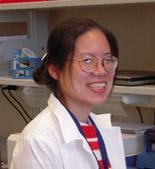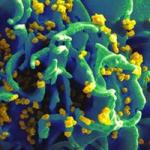
Helen C. Su, M.D., Ph.D.
Senior Investigator
Human Immunological Diseases Section, LCIM
NIAID/DIR
Research Topics
The Human Immunological Diseases Section (HIDS) carries out research to understand the molecular mechanisms regulating the human immune system and how their derangements cause disease. We study patients with poorly characterized, inherited immunodeficiencies and autoimmune diseases, often lacking molecular diagnoses. These patients display combinations of 1) abnormal lymphocyte accumulation in spleens, lymph nodes, or other organs such as the lungs; 2) immunodeficiencies that reflect defective lymphocyte function, with increased susceptibility to virus and other infections; and/or 3) autoimmunity, including hemolytic anemia and idiopathic thrombocytopenic purpura. By carefully investigating these “experiments of nature” we can draw inferences about molecular functions based on patient phenotype. Through a broad program that integrates the patients’ clinical evaluations, assessments of their immune function, genetic and biochemical analyses, we gain insights into the molecular and cellular basis of immunity, particularly against viruses, while also improving diagnosis and treatment.
We are particularly interested in combined immunodeficiencies that lead to susceptibility to virus infections. One example is our discovery of DOCK8 deficiency, which causes patients to have increased susceptibility to various infections, but especially viral skin infections, including herpes simplex virus and human papillomavirus. Our studies in these patients revealed that DOCK8 is crucial for lymphocytes to maintain cell shape integrity when they move within skin that is distinct from other tissues in being characterized by having many highly confined spaces. When DOCK8 is lacking, the resident memory CD8+ T cells in the skin undergo a catastrophic cell breakage, which we term cytothripsis, and this cell death impairs local anti-viral T cell immunity within the skin. Cytothripsis of mononuclear phagocytes also appears to secondarily deregulate T cell differentiation leading to the patients’ severe allergic disease. By applying similar experimental approaches to other patients having novel combined immunodeficiencies, we hope to gain insights into the molecular regulation of the human lymphocytes for antiviral immunity in both normal and diseased states.
We are also interested in inherited defects of innate immunity that can cause increased susceptibility to virus infections, especially those targeting the respiratory tract. One example is our discovery of human MDA5 deficiency in a patient having recurrent severe rhinovirus and other respiratory viruses. The patient’s loss of MDA5 demonstrated the physiological importance of this cytosolic viral nucleic acid sensor for immunity against the common cold virus, and studies are ongoing to determine how MDA5 physiologically contributes in protecting against other viruses in humans. More recently, we have applied similar experimental approaches to patient cohorts having recurrent or severe infections with respiratory viruses including influenza virus and COVID-19 (see https://www.covidhge.com). The latter led to discoveries of genetic defects and neutralizing anti-cytokine autoantibodies that highlight the importance of type I IFN pathways for antiviral innate immunity against SARS-CoV-2 in humans.
For our studies, we bring in patients to the NIH Clinical Center for detailed clinical and research investigations, where we follow their natural history of disease. We have established a broad network of international collaborations and co-lead the NIAID IRP COVID-19 Consortium and the COVID Human Genetic Effort Consortium.
Biography
Helen Su received M.D. and Ph.D. degrees from Brown University. She completed training in pediatrics at St. Louis Children's Hospital, Washington University, and subspecialty training in allergy and immunology at NIAID. After postdoctoral training with Michael Lenardo, M.D., in the Laboratory of Immunology, she joined the Laboratory of Host Defenses in 2007 as a tenure-track clinical investigator and was tenured in 2016.
Selected Publications
- Bastard P, Rosen LB, Zhang Q, Michailidis E, Hoffmann HH, Zhang Y, Dorgham K, Philippot Q, Rosain J, Béziat V, Manry J, Shaw E, Haljasmägi L, Peterson P, Lorenzo L, Bizien L, Trouillet-Assant S, Dobbs K, de Jesus AA, Belot A, Kallaste A, Catherinot E, Tandjaoui-Lambiotte Y, Le Pen J, Kerner G, Bigio B, Seeleuthner Y, Yang R, Bolze A, Spaan AN, Delmonte OM, Abers MS, Aiuti A, Casari G, Lampasona V, Piemonti L, Ciceri F, Bilguvar K, Lifton RP, Vasse M, Smadja DM, Migaud M, Hadjadj J, Terrier B, Duffy D, Quintana-Murci L, van de Beek D, Roussel L, Vinh DC, Tangye SG, Haerynck F, Dalmau D, Martinez-Picado J, Brodin P, Nussenzweig MC, Boisson-Dupuis S, Rodríguez-Gallego C, Vogt G, Mogensen TH, Oler AJ, Gu J, Burbelo PD, Cohen JI, Biondi A, Bettini LR, D'Angio M, Bonfanti P, Rossignol P, Mayaux J, Rieux-Laucat F, Husebye ES, Fusco F, Ursini MV, Imberti L, Sottini A, Paghera S, Quiros-Roldan E, Rossi C, Castagnoli R, Montagna D, Licari A, Marseglia GL, Duval X, Ghosn J, HGID Lab, NIAID-USUHS Immune Response to COVID Group, COVID Clinicians, COVID-STORM Clinicians, Imagine COVID Group, French COVID Cohort Study Group, Milieu Intérieur Consortium, CoV-Contact Cohort, Amsterdam UMC Covid-19 Biobank, COVID Human Genetic Effort, Tsang JS, Goldbach-Mansky R, Kisand K, Lionakis MS, Puel A, Zhang SY, Holland SM, Gorochov G, Jouanguy E, Rice CM, Cobat A, Notarangelo LD, Abel L, Su HC, Casanova JL. Autoantibodies against type I IFNs in patients with life-threatening COVID-19. Science. 2020;370(6515).
- Lamborn IT, Jing H, Zhang Y, Drutman SB, Abbott JK, Munir S, Bade S, Murdock HM, Santos CP, Brock LG, Masutani E, Fordjour EY, McElwee JJ, Hughes JD, Nichols DP, Belkadi A, Oler AJ, Happel CS, Matthews HF, Abel L, Collins PL, Subbarao K, Gelfand EW, Ciancanelli MJ, Casanova JL, Su HC. Recurrent rhinovirus infections in a child with inherited MDA5 deficiency. J Exp Med. 2017;214(7):1949-1972.
- Zhang Q, Dove CG, Hor JL, Murdock HM, Strauss-Albee DM, Garcia JA, Mandl JN, Grodick RA, Jing H, Chandler-Brown DB, Lenardo TE, Crawford G, Matthews HF, Freeman AF, Cornall RJ, Germain RN, Mueller SN, Su HC. DOCK8 regulates lymphocyte shape integrity for skin antiviral immunity. J Exp Med. 2014;211(13):2549-66.
- Zhang Q, Davis JC, Lamborn IT, Freeman AF, Jing H, Favreau AJ, Matthews HF, Davis J, Turner ML, Uzel G, Holland SM, Su HC. Combined immunodeficiency associated with DOCK8 mutations. N Engl J Med. 2009;361(21):2046-55.
Related Scientific Focus Areas




Molecular Biology and Biochemistry
View additional Principal Investigators in Molecular Biology and Biochemistry

This page was last updated on Saturday, November 8, 2025